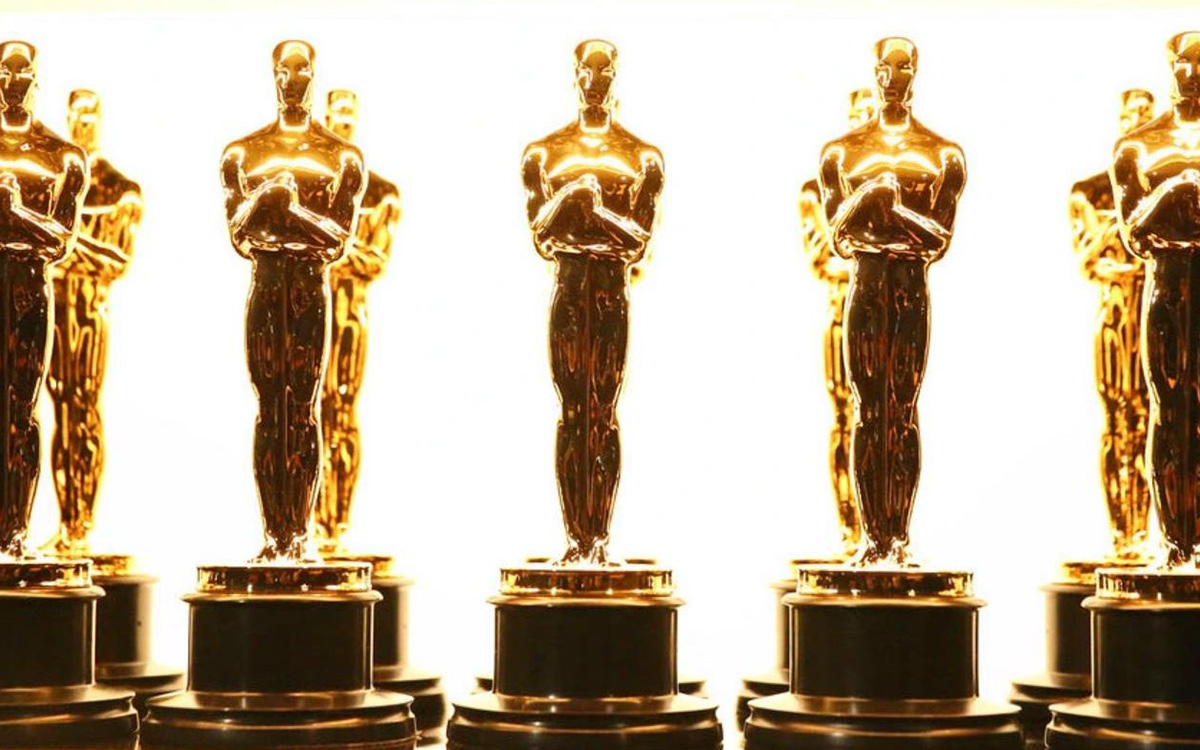Arts & Entertainment
The predictable predictability of the Oscars
Favoring middle-of-the-road prestige over edgier fare

It’s hard to write a reaction piece about the Oscars when you recognize that the Oscars, by their very nature, are essentially a poll – or perhaps, more aptly, a popularity contest – which reflects an aggregate of personal opinions, and therefore have as much to do with internal Hollywood politics as with rewarding artistic excellence.
I’m not saying that the movies and people being celebrated on the stage at the Dolby Theater in Hollywood Sunday night – all of them, winners and nominees alike – didn’t deserve to be there; on the contrary, 2023 was an outstanding year for cinema, and every one of the contenders could be considered worthy of taking the prize. If that’s the case, however, how can any of these outcomes be determined without the influence of personal taste? Making movies is not like playing sports, where a win results from the highest number of points scored and goals blocked; there is no such handily objective criteria to rely on in picking an actor, a screenwriter, or an entire film to proclaim as the “best” in its respective category, and it’s inevitable that Academy voters will be influenced by personal bias when they make their choices on that final ballot.
While Sunday’s 96th annual Oscar ceremony, which offered the usual snubs and oversights and no real surprises, might have disappointed me or even occasionally sparked a glimmer of outrage, I cannot fairly say that any of the final results were “mistakes.” And though it may be oversimplifying things to say that being offended by the Academy’s final choices is akin to being angry that someone else’s favorite flavor of ice cream is chocolate when yours is salted caramel praline, it’s still enough to convince me that my “reaction” piece to the Academy Awards can really only ever be an “opinion” piece,
With that in mind, here we go.
The presentation itself was the usual blend of witty repartee (mostly provided with success by veteran Oscar host Jimmy Kimmel, though attempts at it from the various presenters ran the gamut from delightful to disastrous), musical performances (Billie Eilish and brother Finneas O’Connell’s rendition of “What Was I Made For?”, which went on to win the evening’s only award for “Barbie”, was a particular highlight, alongside the more lavish and deliciously amusing dance production number headed by Supporting Actor nominee Ryan Gosling for “I’m Just Ken” from the same film), uplifting moments (a regal Rita Moreno’s benedictory introduction of “Barbie” Supporting Actress nominee America Ferrera brought tears to my eyes, and I suspect I wasn’t alone), and show-stopping surprises (John Cena’s teasingly faux nudity presenting the Best Costume Design award was a memorable stunt, to put it mildly, as was the combination of Arnold Schwarzenegger and Danny DeVito to do the honors in the Visual Effects and Film Editing categories) – yet it also had more than its fair share of embarrassing gaffes, such as upstaging the “In Memoriam” segment with an overblown production number accompanied by father-and-son operatic crooners Andrea and Matteo Bocelli’s duet of “Con tu partirò”, a move that has fueled perhaps more post-Oscars outrage than anything else from this year’s ceremony.
As for the politics, there were the expected barbs making fun of easy conservative targets, but most of the speeches avoided invoking too much progressive fury. The one overtly political moment came with the win of UK director Jonathan Glazer’s “The Zone of Interest” for Best International Feature, when he read, in prayerlike monotone, a pre-prepared statement warning against the dehumanizing hate depicted in his slice-of-Nazi-life historical drama and calling for empathy for the targets of such hate on both sides of the current crisis in Gaza. It was met with backlash, of course, especially after a partial quote in Variety omitted key elements of the speech and led many to believe the Jewish filmmaker was refuting his own religion.
As for the winners of the awards themselves (you can find the full list on the Oscar website) the evening’s choices fell more or less in line with my predictions – though not necessarily my preferences.
The domination of “Oppenheimer” in most of the major categories in which it competed was, for anyone following the pre-ceremony buzz, a foregone conclusion. Few doubted that Cillian Murphy would handily claim the Best Actor prize – thwarting nominee Colman Domingo (“Rustin”) from becoming the first queer actor to win for playing a queer character in the process – or that Christopher Nolan would take the Best Director category, and from there the win for Best Picture felt as inevitable as anything can be at the Oscars.
Equally inevitable was the evening’s most easily predicted “Oppenheimer” win, as veteran Hollywood player Robert Downey, Jr. ebulliently swaggered onstage amid the enthusiastic familial cheers of his peers to claim the Best Supporting Actor prize; his acceptance speech, in which he self-deprecatingly recalled the legal and professional obstacles arising from the substance abuse that nearly derailed his early career, became a testament to overcoming personal setbacks to achieve an even higher success, something that resonated in the words of several other of the evening’s winners.
In the categories where “Oppenheimer” didn’t win, the odds were already in favor of the eventual victors, such as first-time filmmaker Cord Jefferson, whose “American Fiction” earned him the Best Adapted Screenplay Award over fellow front runners like “Barbie” and “Poor Things,” and Da’Vine Joy Randolph, whose winning Supporting Actress turn in “The Holdovers” had been a juggernaut throughout the award season.
Many Oscar fans, though most accepted the predestination of “Oppenheimer” as the year’s big winner, might rather have seen a different candidate come out on top (my own choice, for what it’s worth, would have been “Barbie,” with “Poor Things” and “Zone of Interest” coming up close behind); but even if Nolan’s weighty and technically dazzling biopic was unquestionably a fine film, exploring a deeply disturbing slice of not-too-distant history that still casts a long existential shadow over our world today, it’s impossible for me not to see in its multiple wins an all-too-familiar pattern of “safe” choices.
While “Oppenheimer” might pique ethical discussions over its title character’s choice to build the atomic bomb, few would find controversy in the idea that the destruction unleashed on the world by that choice is a reason for concern. Its most viable competitors, “Barbie” and “Poor Things” – both of which touched on many of the same existential themes, albeit from a markedly different direction and in a more absurdist style – each stirred divisive opinions around (among other things) a perceived feminist agenda; other highly-acclaimed titles in the running, like the non-English language entries “Zone”, “Past Lives”, and “Anatomy of a Fall”, fell outside the comfortable domestic audience mainstream where Oscar’s favorite picks are usually a little too deeply-rooted to allow much opportunity for a dark horse upset. While not many expected Bradley Cooper’s ambitious Bernstein biopic “Maestro” to take home any awards, it was considerably more noteworthy that Martin Scorsese’s “Killers of the Flower Moon,” nominated for 10 Awards and widely lauded as one of the year’s most essential films, failed to score a single one of them – though I can’t help also noting that it deals with one of most shameful threads in our American past, inevitably making it a controversial movie for an era marked by deeply divided ideologies around that subject.
It’s perhaps for that reason that “Flower Moon” was not considered a front runner in most of its categories, but there was one in which it was seen as a heavy favorite. With Lily Gladstone poised to become the first Indigenous performer to win the Best Actress trophy, the odds leading up to Sunday’s presentation seemed to position them as the front runner; in the end, however, it was Emma Stone’s tour-de-force in “Poor Things” – in which she appeared in virtually every scene, in contrast to Gladstone’s relatively limited screen – that took it instead. Though it wasn’t quite a surprise, given the number of wins Stone has garnered already for the film, which also took home the prizes for Best Makeup and Hairstyling and Best Production Design, it nevertheless felt – to me, at least – like another example of Oscar’s predictable reluctance to court controversy with its choices.
Ironically, but not surprisingly, this conservative approach often just ends up causing a controversy of its own, and this case is no exception. Though I had championed Stone’s brilliant performance as the obvious winner, when her name was announced I found myself feeling disappointment over Goldstone’s loss, even as I was thrilled for Stone’s well-earned victory. After all, in a contest where the outcome is entirely subjective, Academy voters could have chosen to amplify the excellence of someone from within a marginalized community. Stone, who seemed as surprised at her win as anyone else, did remarkable work, but so did Gladstone; though it truly is “an honor just to be nominated,” it was an opportunity for Oscar to take a step toward correcting a long-ignored injustice at a time when doing so could make a demonstrably constructive impact on our culture and our society at a time when doing so would have a tremendous cultural impact, and it didn’t happen. It was a moment that struck me with an odd sense of disappointment even as I cheered for Stone; a bit of the sour within the sweet.
That, aside from a sense of missed opportunity over the evening’s consistent pattern of favoring the middle-of-the-road prestige represented by “Oppenheimer” over the edgier, more confrontational material presented by some of the other titles on the slate, was my biggest takeaway from the Academy Awards. Though I can’t say that any of the winners were unworthy, I can’t help thinking that their victories were somewhat tainted by the virtual shutout of “Barbie”, (which still feels to me like a message for female filmmakers to “stay in their lane”) and relatively low showing for “Poor Things” (which took only 3 of the 11 awards for which it was nominated), and that their underappreciation for such films was for me proof that many of the professionals working within the industry are afraid of material that pushes the medium too far outside its traditional boundaries, that dares to imagine stories and ideas which give voice to “outsider” concerns beyond the level of lip service, or that stretches the accepted limits of narrative entertainment.
More concerning, perhaps, is the minimal change that has come in the wake of the Academy’s much-publicized retooling to promote greater diversity and inclusion among the nominees. While it’s heartening to see people of color and queer people being brought into the mix more consistently than ever before, it’s also all the more painful when we see them passed over or relegated to the status of “also ran” most of the time. As a queer writer working for a queer publication, it’s impossible for me not to be impatient when films with strong LGBTQ content are lauded alongside mainstream titles only to consistently be passed over when it comes to the final victory. While queer subject matter, in varying degrees, was part of movies like “Rustin”, “Nyad”, and even “Barbie,” only two wins in the “major” categories went to films that included significant queer themes – “American Fiction” and “Anatomy of a Fall”, both of which won for their screenplays.
And while it’s now old news, the Academy’s complete omission of Andrew Haigh’s melancholy gay ghost story “All of Us Strangers,” a queer UK film overwhelmingly embraced by other major awards bodies across the world and in America itself and considered a major contender before failing to earn a single Oscar nomination, and female filmmaker Emerald Fennell’s “Saltburn,” which hinged – at least ostensibly – on a queer attraction between stars Barry Keoghan and Jacob Elordi, speaks volumes about the comfort level surrounding queer content within mainstream Hollywood. Even “May December,” a high-profile film directed by queer indie pioneer Todd Haynes but featuring only presumably heterosexual characters, received only a single nod (for Best Original Screenplay) for “May December,” despite being widely considered a front-runner for several acting awards. While inclusivity doesn’t mean considering every queer-relevant movie a shoo-in for the competition, it’s telling when the Academy all but ignores queer titles that have been contenders and even winners at all the other major film award ceremonies, and frankly, it’s extremely annoying. While I can’t speak for women, those in the Black community, or other groups with a history of being dismissed by Oscar, I can only assume that their sentiments must resemble my own.
Yet as I reach the end of my observations about the latest installment of the Academy Awards, I find myself falling short of blaming the Academy itself, at least as an organization. While it has had a problematic history of dragging its feet when it comes to evolving toward a more all-embracing approach to bestowing honors, undeniable progress has been made. That this progress is infuriatingly slow is less a reflection on the awards than it is on Hollywood as a whole; after all, despite Academy efforts to ensure greater diversity among its nominees, it’s the individual choices of its voters that determines the final results – and if those results fail to accomplish more than the occasional token victory for the non-white-heterosexual contenders, it’s a symptom of the fact that those voices are underrepresented within the industry at large.
If we want to see an Academy Awards ceremony that truly accomplishes the kind of all-inclusive spirit for which it has so palpable a potential, we must continue to pressure the Hollywood industry at large to build a more diverse and inclusive creative environment. Otherwise, no matter how much they promise to do better, they will always fall short.
Out & About
Plan your wedding the LGBTQ way
Washington D.C. LGBTQ+ Wedding Expo scheduled for Sunday

Rainbow Wedding Network will host “Washington D.C. LGBTQ+ Wedding Expo” on Sunday, March 1 at 12:30 p.m.
Guests can meet and mingle with a curated selection of LGBTQ-welcoming wedding professionals from across the region, each ready to help bring your vision to life, and spend a beautiful afternoon exploring everything they need to create a celebration that reflects them.
There will be a relaxed, self-guided look at the Watergate’s spaces and amenities, savor signature cocktails and delicious tasting samples, and connect with other couples who are on the same journey.
Visit Eventbrite to reserve a spot.

Friday, February 27
Center Aging Monthly Luncheon With Yoga and Drag Bingo will be at 12 p.m. at the DC Center for the LGBT Community. Email Mac at [email protected] if you require ASL interpreter assistance, have any dietary restrictions, or questions about this event.
Go Gay DC will host “LGBTQ+ Community Happy Hour Meetup” at 7 p.m. at Freddie’s Beach Bar and Restaurant. This is a chance to relax, make new friends, and enjoy happy hour specials at this classic retro venue. Attendance is free and more details are available on Eventbrite.
Trans Discussion Group will be at 7 p.m. on Zoom. This group is intended to provide an emotionally and physically safe space for trans people and those who may be questioning their gender identity/expression to join together in community and learn from one another. For more details, email [email protected].
Saturday, February 28
Go Gay DC will host “LGBTQ+ Community Brunch” at 11 a.m. at Freddie’s Beach Bar & Restaurant. This fun weekly event brings the DMV area LGBTQ+ community, including allies, together for delicious food and conversation. Attendance is free and more details are available on Eventbrite.
The DC Center for the LGBT Community will host “Sunday Supper on Saturday” at 2 p.m. It’s more than just an event; it’s an opportunity to step away from the busyness of life and invest in something meaningful, and enjoy delicious food, genuine laughter, and conversations that spark connection and inspiration. For more details, visit the Center’s website.
Black Lesbian Support Group will be at 1 p.m. on Zoom. This is a peer-led support group devoted to the joys and challenges of being a Black lesbian. You do not need to be a member of the Beta Kappa Chapter or the Beta Phi Omega Sorority in order to join, but they do ask that you either identify as a lesbian or are questioning that aspect of your identity.Send an email to [email protected] to receive the zoom link.
Sunday, March 1
LGBTQ+ Community Coffee and Conversation will be at 12 p.m. at As You Are. This event is for people looking to make more friends and meaningful connections in the LGBTQ community. Attendance is free and more details are available on Eventbrite.
Monday, March 2
“Center Aging: Monday Coffee Klatch” will be at 10 a.m. on Zoom. This is a social hour for older LGBTQ+ adults. Guests are encouraged to bring a beverage of choice. For more information, contact Adam ([email protected]).
Tuesday, March 3
Universal Pride Meeting will be at 7 p.m. on Zoom. This group seeks to support, educate, empower, and create change for people with disabilities. For more details, email [email protected].
Wednesday, March 4
Job Club will be at 6 p.m. on Zoom upon request. This is a weekly job support program to help job entrants and seekers, including the long-term unemployed, improve self-confidence, motivation, resilience and productivity for effective job searches and networking — allowing participants to move away from being merely “applicants” toward being “candidates.” For more information, email [email protected] or visit www.thedccenter.org/careers.
Center Aging Women’s Social and Discussion Group will be at 6 p.m. on Zoom. This group is a place where older LGBTQ+ women can meet and socialize with one another. There will be discussion, activities, and a chance for guests to share what they want future events to include. For more information, email [email protected].
Thursday, March 5
The DC Center’s Fresh Produce Program will be held all day at the DC Center for the LGBT Community. People will be informed on Wednesday at 5 p.m. if they are picked to receive a produce box. No proof of residency or income is required. For more information, email [email protected] or call 202-682-2245.
Virtual Yoga Class will be at 7 p.m. on Zoom. This free weekly class is a combination of yoga, breathwork and meditation that allows LGBTQ+ community members to continue their healing journey with somatic and mindfulness practices. For more details, visit the DC Center’s website.
a&e features
Transmission DC breathes new life into a storied sound space
A fresh home for boundary-pushing culture on H Street

Late last year, phoenix-style, a fresh home for boundary-pushing culture arose on the H Street corridor. Transmission DC – a queer, trans, and POC-owned, operated, and centered community-focused venue – powered on in the former home to the Rock & Roll Hotel (famously, not a hotel, but very much rock & roll). Transmission (1353 H St., N.E.) arrives secure in its mandate – or even birthright – to provide a place to celebrate creativity and music through a lens of inclusivity and respect.
Transmission’s team brings experience, but also representation. Owners/partners Kabir Khanna (who is also programming director), Katii B, Ellie McDyre, and Kelli Kerrigan together previously managed 618 productions, a venue in Chinatown, crafting “some of D.C.’s freakiest parties, raves, and mosh pits” they note.
They packed up operations last fall to a space curated specifically for D.C.’s underground music and culture scene, building their efforts in Chinatown to bring in more fans in queer and POC circles.
Transmission, Khanna points out, is built on DIY values. In the music scene, DIY means that promoters and organizers – often disconnected from the mainstream and part of marginalized communities – build shows and programs collaboratively, but independently from institutions, supporting each other as smaller, independent venues close. Here, Transmission aims to ensure that those putting together these underground inclusive shows have a more permanent and stable home, can have access to resources, and can provide more sustainable income to artists. “We’re trying to get more people to support and enjoy the music, and also give artists and organizers within the DIY community more structure and a larger cut,” says Khanna.
Khanna also notes that Transmission operates “under the principles of safety, inclusivity, and respect.” McDyre added that even at venues that claim inclusivity, that statement might not take place in practice. We’re “not just pitting up a rainbow flag,” says McDyre, but as some of the owners are trans and POC, audiences can see themselves reflected at the top.
Much like the DIY nature of the music community, the Transmission owners brought a DIY ethos to turning around their space.
In March 2020 – the height of COVID lockdowns – Rock & Roll Hotel suddenly shuttered, though not due to the pandemic; instead, the venue claimed that decreasing sales and increasing competition led to the closure. For 14 years, it was the central spot for cheap beer and lesser-known and celebrated acts. The space stood vacant for more than five years, until Transmission turned the power back on.
“When we got into the space, it was effectively abandoned for years,” says Khanna. “There was a ton of mold, and paint primer covering all surfaces. It was nearly falling apart.” Khanna noted that many music venues like this one, regardless of how well it was maintained, “get the shit kicked out of it,” given the nature of shows. The team called in mold removal contractors, ripped up most of the floorboards, and started fresh.
Transmission’s first floor is styled as a stripped-down black box: the better to take in the music. “It’s minimal on purpose to act as a canvas for set design and music,” without a specific aesthetic, says Khanna. Moving upstairs, the second floor has been opened up, removing some walls, and now has a larger dance area than the first floor. Beyond the first two performance levels, and a holdover from Rock & Roll Hotel, is the rooftop. Though without a stage, the rooftop space is filled with murals splashed across the walls, with a full bar. Transmission’s current capacity is 496, but the team is looking to grow that number. Transmission will also leverage the full kitchen that Rock & Roll Hotel operated, bringing in Third Hand Kitchen to offer a variety of food, including vegan and vegetarian options.
Khanna pointed out an upcoming show reflective of Transmission’s inclusive ethos: Black Techo Matters on Feb. 27. The event is set to be “a dynamic, collaborative night of underground electronic music celebrating Black History Month.” Khanna says that techno came from Black music origins, and this event will celebrate this genesis with a host of artists, including DJ Stingray 313, Carlos Souffront, and Femanyst.




















